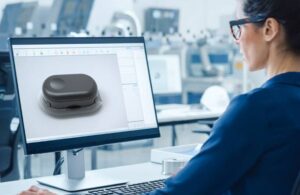
The companies teamed up to design and eventually commercialize a proprietary, non-invasive, wearable CGM device. They aim to remove the technology and patient-care roadblocks that exist within continuous glucose monitoring.
Phillips-Medisize develops drug delivery, in vitro diagnostic and medtech devices. Finland-based GlucoModicum utilizes magnetohydrodynamic (MHD) technology to quickly and easily extract a glucose sample. This technology applies a small amount of energy directly to interstitial fluid to drive it to the surface of the skin.
The device utilizing this technology, called Talisman, adheres to a patient’s arm. It integrates MHD technology, ultra-sensitive biosensors and advanced algorithms while connecting to a smartphone app. The device remains investigational.
Nearly a year ago, GlucoModicum shared results from the MHD technology based on glucose tolerance tests for five healthy volunteers. This supported previous data demonstrating the technology was 13 times more effective than other needle-free approaches tested in extracting interstitial fluid from the skin. Additional testing found the biosensor proved eight times more sensitive to glucose molecules compared to other biosensors on the market.
“We wanted to create a solution that is needle free, accurate and more affordable so people would better monitor their glucose,” said Jokke Mäki, managing director of GlucoModicum. “Working with Phillips-Medisize, we applied compelling science to develop a world-class product that may help billions of people better manage their diabetes.”
How Phillips-Medisize and GlucoModicum came together
GlucoModicum sought out Phillips-Medisize as an experienced CDMO to assist in bringing the Talisman to market.
In developing the device, Phillips-Medisize applied expertise in industrial design, mechanical and electrical engineering, connectivity, material science, miniaturization, supply chain management, software development, manufacturing, testing, quality assurance and regulatory compliance.
The companies have preparations onderway to leverage Phillips-Medisize’s global manufacturing footprint and more. They plan to utilize the company’s supply chain network and assembly automation capabilities. Phillips-Medisize says they plan to produce hundreds of millions of devices and biosensors once in-depth clinical studies and regulatory approvals come.
There could also be further uses of the technology to support the management of other diseases.
“We started with ideas, concepts and drawings,” said Homer Fairley, business development manager for Phillips-Medisize. “The day we provided the finished sample product to GlucoModicum was a moment of celebration for both parties, as it really brought the possibilities to life. Now that there is a proven concept, we look forward to the opportunity to leverage Phillips-Medisize’s high-volume manufacturing capabilities to produce hundreds of millions of units on time and in a cost-effective manner. That’s a big benefit to this project.”
